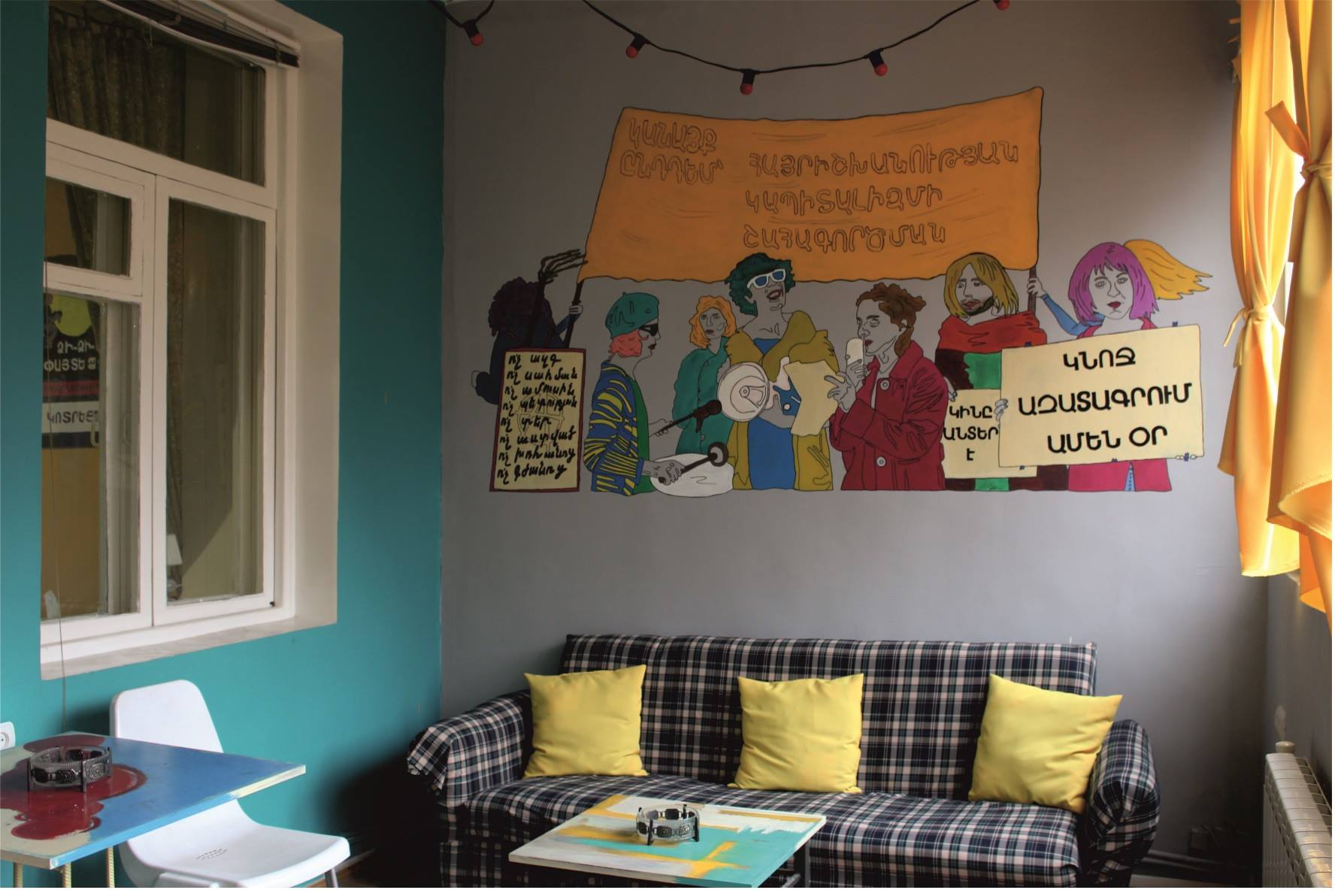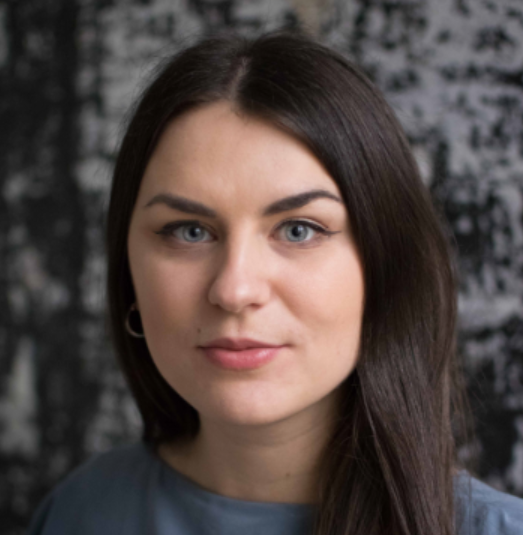The participation of women in the 2018 “Velvet Revolution” was highly emphasized by Armenian and foreign media. Alsharq talked to queer feminist and activist Anna Nikoghosyan about the role of women in the country’s current transformation and Armenia’s first feminist library which she cofounded. By Anna-Theresa Bachmann
Background: Starting in April 2018, Armenia’s streets witnessed mass demonstrations under the leadership of opposition politician and journalist Nikol Pashinjan and his “My Step” campaign. The protestors’ anger was directed against the corruption and misuse of power by the national-conservative Republican Party whose leader and former president Serzh Sargsyan had just been appointed prime minister. Dubbed the “Velvet Revolution”, the protests led to the resignation of Sargsyan on April 23, 2018. This marked the beginning of restructuring Armenia’s political leadership.
Anna Nikoghosyan, you are one of the feminist activists participating in last year’s mass protest. Was the Armenian “Velvet Revolution” a turning point in the history of women’s mobilization or was their role overemphasized?
Both media and political figures described female participation in the protests as extra ordinary, as something previously unseen. This wording vanishes not only women’s participation but also their setup and coordination of civic and political movements in Armenia throughout the years prior to the revolution.
Women always had a big role in political and civic movements in Armenia such as the “Mashtots park” and the “100 dram” movements. But their role was never recognized. It was always men who took the credit. Through the year long work of women and feminists, women became gradually visible in the civic and political sphere. This led to a shift of mentality which recognized women in playing a certain role in the revolution. But this ascribed role is in itself problematic.
Why?
Women are still portrayed as piece makers and negotiators according to cultural expectations and the gendered representation within our society. Even today’s prime minister Nikol Pashinyan said during one of his speeches: "It is because of women that the revolution was peaceful." There were so many incidences when male drivers wanted to negotiate with male activists about opening blocked crossroads. The male protestors were willing to compromise this. It was women who were not.
You yourself were arrested during one of the protests and detained for several hours. How did this happen?
Me and some of my female friends had organized a feminist protest under the slogan of “Serzh is not our father, we do not have a father” which we shouted while blocking one of Yerevan’s major crossroads. When things got heated, the police took me because I was the one holding the megaphone. I was struggling to hand it over to my friend because I did not want the police to take it. At the time, there were not many megaphone in Armenia, so every single one mattered. A few days prior to this incident, it was actually the same megaphone Nikol Pashinjan took from me because he did not have one himself.
Would you say that the involvement of women changed the public’s perception of feminism in the long run?
Unfortunately, I do not think so. Because the revolution itself was not really tackling feminist issues even though there were some feminist elements on the local level. But they were not translated into the bigger picture: In May 2018, we organized two big demonstrations which aimed at taking down the then major of Yerevan, Taron Margaryan, …
…who also belongs to the Republican Party and who had entered office in 2011. His popularity had fallen over the years because of high corruption, money laundering, and as he ordered to demolish historical buildings to build business parks. What had sparked another controversy was the physical and sexual assault of two female politicians during a City Council meeting in February 2018 by members of his party.
We organized two big demonstration which hundreds of people attended. The main organizers were feminists including myself. When we were reading out our speeches on stage, as it was streamed online, several people were commenting: "Do not trust them, because they are feminists. Our goal is that Pashinyan becomes prime minister. There is no need to tackle the local government". The mistrust and hatred are still there, and they are being cultivated by anti-revolutionary forces backed by Robert Kocharyan, the second president of Armenia, and anti-gender nationalist groups supported by Russia.
Coming back to today’s prime minister Nikol Pashinjan: Before he took office, the country ranked on place 115 out of 149 regarding women’s political empowerment and there were only 17 percent female MPs. During the revolution, Pashinjan had encouraged women to play a bigger role in the future political transformation of Armenia. Did he succeed?
No, he did not. On the one hand, women make up one quarter of the MPs now and some of them are very young. On the other hand, we only have one female minister, Zaruhi Batoyan, who is in charge of the Ministry for Labour and Social Affairs. Several friends and I tried to promote her to become the major of Yerevan [after Taron Margaryan’s resignation: editor’s note]. I wanted to see her in this position because she is a woman, she has a disability and she is very sensitive to many issues. But for me as a radical feminist, female political leadership is not my priority.
Could you elaborate on that?
I do not feel that women’s appearances within a patriarchal power structure will mean something to me as a woman and feminist. The idea of feminism is rooted in the struggle against power. I rather fight for cultural and societal changes from a grassroots level because there won’t be real change until we change things on the ground.
One of these grassroots initiatives is Armenia’s first feminist library that you were able to open after kicking off an online crowdfunding campaign in 2017. What is this space all about?
My friends and I created a community space that unites feminist academia, art and activism in one place. It is a feminist and queer space designed particularly for women, girls, feminists but also open to anyone else who wants to deepen their knowledge on feminist and queer studies. For that purpose, we gather books from all over the world – 500 so far, and 200 journals - organize book and reading clubs, movie screenings and discussions, poetry reading and much more. These kinds of changes are more important to me than the tokenistic approach of women’s participation in politics.

What is the public’s perception of the place?
It was first opened in July 2018 but was shut down by homophobic neighbours who had complained to our landlord and accused us of organizing homosexual gatherings which resulted in us being kicked out. After that we reopened in December 2018 at a different location in downtown Yerevan - an expensive area that we chose for security reasons. Those who know us and new people coming to the library are amazed and say they were craving for such a space. Of course, there are also people who hate and target us. Every day, we expect to be attacked online or physically by right wing groups.
How is the library financially sustained?
We have funding until the summer. After that I do not know how we will manage. We are trying to mobilize resources but a space like this is not very popular for donors. They prefer advocates for policy or legal changes, and we are very clear about what we want to do and what we don’t want. Most of the people are volunteering. Only the cofounders and the accountant get a small honorarium for project related responsibilities. The rest – 1000 Euro per month – is rent and utilities.
If you had to choose three books from the library shelves…
…it would be Judith Butler’s “Gender Trouble”. That book totally changed my perception of gender. Then I would highlight the poetry of Shushanik Kurghinyan [1876-1927, editor’s note] who is an Armenian feminist writer. On one of our walls we did a painting inspired by one of her poems. The third one is “Sublime Mutations” by Del LaGrace Volcano about queering your body and sexuality.
What do you wish for International Women’s Day?
I would like women to free themselves from any structure like family, the state and other institutions. I want them to always be disobedient, to resist power and hierarchies.

















